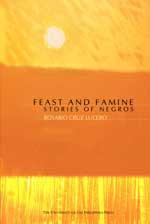Feast and Famine: A Book Review

Below is a slightly revised version of my book review of Feast and Famine: Stories of Negros, Rosario Cruz Lucero's second collection of short stories, which was published in the May/June 2004 issue of The Reviewer. As I had guessed, the book later won the 2004 National Book Award for Fiction, together with another Negros-themed book, Vicente Garcia Groyon's The Sky Over Dimas.
Title: Feast and Famine: Stories of Negros (2003)
Author: Rosario Cruz Lucero
Publisher: University of the Philippines Press
Most local short-fiction collections today often contain stories with recognizable middle-class characters dealing with modern-day issues against a familiar urban landscape. But not Rosario Cruz Lucero’s Feast and Famine: Stories of Negros. The title says it all: the richly textured, award-winning stories included in this slim but superb book are set in sugarcane country, a place that’s at once magical and mysterious.
The ironically titled “The Death of Fray Salvador Montano, Conquistador of Negros,” which won first place at the 2001 Palanca Awards, focuses on a fraile during the Spanish colonial period who steadily finds himself overwhelmed by the disturbing exoticism and sensuality of the land to which he is assigned. On the other hand, “The Composo of Hacienda Bayung,” which was a finalist at the 2000 NVM Gonzalez Awards, is set in the post-Marcos era and deals with a string of mysterious disappearances that took place in the title setting.
The collection also contains two stories that won first place in the Philippines Free Press Literary Awards. The first, “Good Husbands and Obedient Wives,” which won for 2002, poses an intriguing question: Did the woman “kill” her husband out of wifely duty, or is out of something else? And the second, “The Oracle of the One-Eyed Coconut,” which won for 2003, presents different theories as to what led a town mayor to be assassinated.
But the best story, to me, is “Doreen’s Story,” which won first place at the 2003 Palanca Awards. Clever and inventive, this is metafiction that actually works. Here, Lucero uses characters, factual and fictional, and previously produced oral and written information to create a story that explains the necessity of writing it. How can one top a story like that?
Lucero’s firm, precise prose brings these stories to life. Her language may not be that lyrical, but the stories nonetheless radiate with their own special magic. And the rich details she invests them with betray her close familiarity with their setting. No surprise there, since she spent her formative years in Negros. With this collection, Lucero joins Reynaldo Duque of Candon and Carlos Aureus of Naga in putting the home of her youth in the map of Philippine literature.
The verdict: Literature students and teachers may remain to be the collection’s most receptive audience, but ordinary readers should find Feast and Famine: Stories of Negros worthwhile. The best stories often transport readers to another place, another time, whether they’re familiar with it or not. And Lucero’s stories do just that. Hm, I smell a possible National Book Award soon. (Copyright © 2004 by A.I.D.)


<< Home